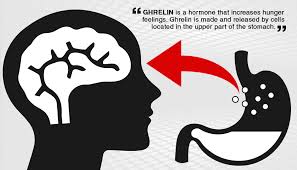‘Hormones’. Oestrogen and testosterone are the two that most likely spring to mind, and their role in puberty, libido, and the reproductive system.
Our bodies produce a whole host of other hormones which play a role in our health and how we function daily. Given its name as a ‘growth hormone releasing peptide’, Ghrelin controls hunger, food intake, and fat storage combined with growth hormone.
Stimulated by the cells in our stomach, Ghrelin sends signals to the hypothalamus in the brain, telling our bodies it’s time to eat. The pancreas and the small intestine also release small amounts. The more Ghrelin in the bloodstream, the bigger the appetite and, likely, the more food you eat. After food, ghrelin levels are decreased as we’re satiated, and they don’t rise again until your body starts looking for more energy.
You might wonder how to keep your levels low if you’re trying to lose weight. To be clear, Ghrelin is not bad. Our hormones are made for a reason – they have  a specific job to do in the body. If we weren’t ever hungry, would we take as much joy from our food? How would we know when we’re low on nourishment? How would we function at our optimum?
a specific job to do in the body. If we weren’t ever hungry, would we take as much joy from our food? How would we know when we’re low on nourishment? How would we function at our optimum?
We can run into trouble when they stop working as they should. And our diet and lifestyle choices have a significant impact on this.
That doesn’t mean jumping to calorie restriction. Naturally, this will increase your ghrelin levels, potentially leading to overeating and fat storage. Interestingly, research has shown lower fasting levels of Ghrelin in individuals who are overweight, obese or morbidly obese, suggesting that over time, overeating can decrease sensitivity to the hormone, meaning we lose this essential control mechanism.
However, it’s important to note that Ghrelin may be equally crucial for weight gain. It’s all about balance. So, we’ve highlighted a few tips here, which will help keep this specific hormone in check and doing its job correctly at both ends of the spectrum.
Eat a fibre-rich diet of fruit and vegetables, legumes and whole grains. Fibre slows down digestion while keeping our gut bacteria diverse and healthy.
Foods high in fibre also tend to be lower in calories and higher in nutrient density, meaning you get a better bang for your buck in calorie intake.
Limit intake of high GI carbohydrates and processed foods high in sugar and artificial sweeteners.
Refined and processed foods are high in calories and saturated fat and low in nutrients. As well as spiking your blood sugar for a short period, sending your hunger and energy levels on a rollercoaster, they trigger the release of dopamine, the neurotransmitter associated with reward. We start to associate that short-lived high with reward as opposed to the feeling of being nourished and satiated.
Eat protein with every meal.
Incorporating a portion of lean or vegetable protein into each meal (eggs, oily fish, organic chicken or turkey, tofu, beans and pulses) will slow gastric emptying, keeping you fuller for longer. It will also blunt the insulin spike you get from eating a carbohydrate-based meal, preventing the sugar cravings which inevitably follow that initial sugar high.
Reduce stress
Studies in animals have shown that exposure to chronic stress increases circulating ghrelin and growth hormone levels (Massachusettes Institute of Technology, 2013). It also interacts with the brain’s reward pathways to increase food intake, creating a vicious cycle where we see food as a comfort during stress and anxiety. Incorporate yoga, meditation or breathing into your daily routine, get out for a walk or run in nature, and find something that works for you to allow you to live (and eat) more mindfully.
Sleep well
Sleep deprivation has been associated with increased ghrelin levels, appetite and hunger compared to sleeping for extended periods. Aim for 7-9 hours per night, practice good sleep hygiene by limiting screen time, avoiding heavy meals and alcohol before bed, and sticking to regular sleep and waking up times to regulate the circadian rhythm.
Exercise
Research in recent years has indicated a link between High-Intensity Interval Training (HIIT), reduced Ghrelin and increased leptin levels. Incorporate high-intensity exercise into your weekly lifestyle – circuits, sprints, cycling. Get out and get a sweat on!
Incorporating these diet and lifestyle changes would be a great place to start if you’re looking for weight loss or weight gain support. However, it’s important to remember that Ghrelin is only one of many interrelated factors that could impact your health and wellbeing. Working with a Holistic Therapist would allow you to create a plan specific to your body’s needs and personal health and fitness goals. For more information on what this involves, please do get in touch.











